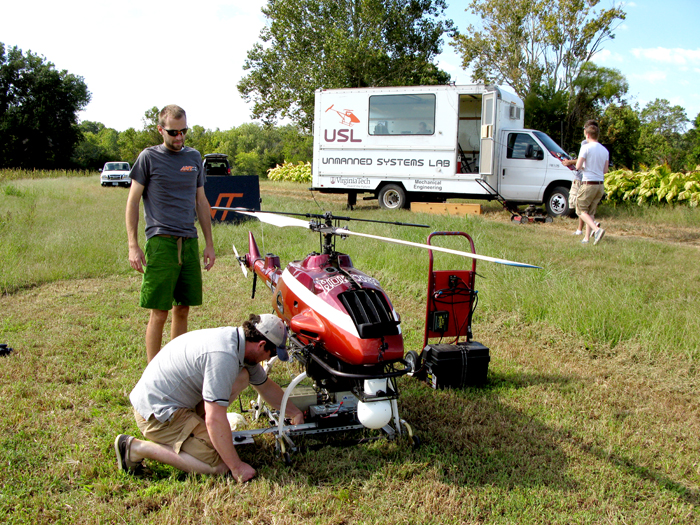Leaders welcome FAA nod to test unmanned aircraft; Virginia Tech positioned to lead new industry

University leaders in Virginia and New Jersey welcomed the Federal Aviation Administration’s approval on Monday of their proposal to operate a test site to integrate unmanned aircraft into the national airspace.
With plans for the University of Maryland to join the partnership, efforts to introduce the safe and responsible use of unmanned aerial vehicles to the nation will be well-represented in the mid-Atlantic.
“Virginia Tech and its partners are positioned to lead growth in a dynamic, new industry,” said Virginia Tech President Charles W. Steger. “Integrating unmanned aircraft into the national airspace is a great responsibility, one that our faculty members and government, university, and industry partners take very seriously. We are ready to meet this challenge.”
In September, Virginia Gov. Robert F. McDonnell, Gov. Chris Christie of New Jersey, and Gov. Martin O’Malley of Maryland expressed their commitment to jointly support test-site infrastructure in a letter to the Department of Transportation and the Federal Aviation Administration.
“Rutgers is well positioned to support the FAA’s research and testing efforts to ensure that unmanned aircraft systems can fly safely in our nation’s skies,” said Rutgers University President Robert Barchi. “Building on our region’s important contributions to flight research, we look forward to working with our mid-Atlantic partners as we enter this exciting new era of aeronautical innovation.”
The FAA has until 2015 to develop regulations aimed at limiting the privacy and safety concerns associated with unmanned aircraft. Congress called for the establishment of six national unmanned aircraft system research and testing sites through the FAA Modernization and Reform Act of 2012.
While much of the testing to date has been conducted under defense programs, continued work on the integration of unmanned aircraft into the national airspace will be implemented through a combination of federal, state and local government resources, along with academic institutions and private industry.
New Jersey and Virginia submitted a joint proposal led by Virginia Tech as the Mid-Atlantic Aviation Partnership, which unites academic, industry, state government and economic development organizations.
The University of Maryland, College Park, was the lead agency in the Maryland application for an FAA test site, bringing together a similar consortium of groups and test ranges.
After submitting the applications, the three universities agreed to work as a united team to enhance the region's competitive position in the event that either or both proposals were selected by the FAA.
More recently, the Commonwealth of Virginia announced it will award more than $2.6 million over three years in Federal Action Contingency Trust (FACT) funds to Virginia Tech to operate an unmanned aircraft systems test site.
The funds will take the Mid-Atlantic Aviation Partnership from its current “volunteer” status to a fully functional and revenue-producing organization, capable of competitively analyzing and testing unmanned aircraft systems for industry and government.
“With our partners, we firmly believe we can introduce this new technology the right way,” said Jon Greene, interim director of the Mid-Atlantic Aviation Partnership and an associate director of Virginia Tech’s Institute for Critical Technologies and Applied Science. “Separately the team members have flown unmanned aircraft systems for thousands of hours, and now we have joined together to conduct unmanned aircraft systems research, development, and test and evaluation activities.”
In addition to expertise, the mid-Atlantic region contains both uncongested and restricted airspace, land and water terrain, and access to sea-level and high altitudes. The region also has an extensive agricultural base, which is considered the primary growth area for unmanned aircraft systems technology.
Integrating Unmanned Aircraft Systems into the national airspace could add more than $13.6 billion to the nation’s economy by the end of the decade, reaching as high as $82.1 billion by 2025, according to the Association for Unmanned Vehicle Systems International.
Dedicated to its motto, Ut Prosim (That I May Serve), Virginia Tech takes a hands-on, engaging approach to education, preparing scholars to be leaders in their fields and communities. As the commonwealth’s most comprehensive university and its leading research institution, Virginia Tech offers 240 undergraduate and graduate degree programs to more than 31,000 students and manages a research portfolio of $513 million. The university fulfills its land-grant mission of transforming knowledge to practice through technological leadership and by fueling economic growth and job creation locally, regionally, and across Virginia.




